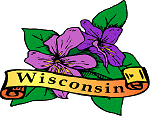

Biographical Sketch of
Eli Seymour
Transcribed by Sandra Boudrou for the Marquette Co WI Pages
Source: Portrait and Biographical Album of Green Lake, Marquette and Waushara Counties, Wisconsin, published 1890 by Acme Publishing Co., Chicago, Pages 690 - 691 Eli Seymour, deceased, was a man of prominence and influence in Green Lake County, and at his death the community lost one of its best citizens. He was a native of England, having been born in that country about the year 1820. His boyhood days until fifteen years of age were there spent, but in 1835 he embarked for America, locating near Quebec,Canada, where he made his home for some years. During his residence in that place he became acquainted with and wedded Miss Mary Ann Garner, and previous to their removal to Wisconsin four children were born unto them: Aluvia, now the wife of W. A. Bangs; Cornelius, Priscilla and Rose. In 1855 Mr. Seymour determined to cast his lot with the early settlers of Wisconsin and chose Green Lake County as the scene of his future operations. He settled in the town of Kingston, and there the family circle was completed by the birth of six other children: Horace, who is now engaged in farming in the town of Kingston; Josephine H., wife of William Paine, also a resident farmer of the town of Marcellon; Hattie, wife of James Hamer, who is engaged in agricultural pursuits; Mary, who wedded William Dalton, a farmer near Portage, Wis.; Horatio and Francis. Throughout his entire life Mr. Seymour engaged in farming and was thus employed at the time of his death. His wife was called home in 1884. She was a devoted Christian woman, a tender and affectionate mother and a loving wife. Both she and her husband were for many years members of the Baptist Church, but during his residence in Wisconsin Mr. Seymour united with the Methodist Episcopal Church. He was conservative and a man of strong convictions, yet he accorded to all the right of opinion, believing that each one should form their ideas according to their own judgment, not relying upon the wisdom of others. In manner he was plain and unassuming, never obtrusive and ostentatious but winning the respect and love of all by his true worth. To the Democratic party he gave his most earnest support and did all in his power to advance its interests and insure its success. Another subject which he considered paramount to almost all others was the temperance question. None were more opposed to the liquor traffic or more heartily desired to see it banished from the land. He joined the Independent Order of Good Templars, believing that in that organization he might best further the interests of the cause, but he never held membership in any other civic society. He survived his wife about four years, dying in the month of September, 1888. His loss was sincerely mourned. All who had known him felt the deepest sympathy for the bereaved family, knowing that his place could never be supplied. Other interests may come to take their time and attention, but he will never be forgotten while memory lasts.
Back to the Marquette Pages Menu